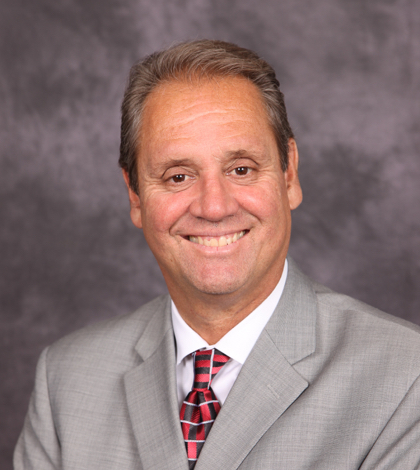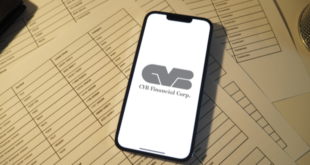Gene Valdez left Citizens Business Bank to start a company that coaches CEO’s on how to start or improve their business. It’s an unusual move for someone who’s been in banking for 30 years, but Valdez said it’s what he needs to do.
Most people would never dream of walking away from a successful 30-year career and starting all over in a new venture.
Gene Valdez, who spent three decades in the banking industry, decided he couldn’t do anything else.
“It’s a big plunge, but I knew I had to do it,” said Valdez, who last month left Ontario-based Citizens Business Bank, where he was senior vice president and business center manager, to start The CEO Teachers, a business coaching and consulting firm that will help small businesses get off the ground.
“I enjoyed working for Citizens Business Bank, I liked working with the people there and we had an amicable parting, but I knew I didn’t want to be a banker for the rest of my career. It just wasn’t fulfilling enough.”
One month into his new business, Valdez has already signed five clients. More important, he’s doing what he really wants to do.
“If someone comes to me and says I helped them get their business started, or I helped them fix it and now their family life is better or they’re feeling better about themselves, that’s the ultimate satisfaction,” Valdez said. “If I hear that, I’m happy.”
Valdez, a Lynwood native who graduated from UCLA in 1974 with a degree in psychology and later got his MBA at USC, is familiar with helping businesses arrange loans and get started. That was his specialty at Citizens Business Bank, and he performed similar functions at Community Bank, also based in Ontario, and Pacific Mercantile Bank, which is headquartered in Costa Mesa.
This is not Valdez’s first time running a company that chief executive officers sharpen their game. He ran a similar business in the early 1990s, the first time he decided to get out of the banking industry. A move that ended up being temporary.
Valdez spoke with IE Business Daily recently on making the transition to running his own business, why now is a good time to try what he is doing and how he might have reacted to the business model for The CEO Teachers had it crossed his desk when he was a banker.
Q: This would appear to be a risk, maybe even a big one, that you’re taking because you’re walking away from a sure thing to start something from scratch. Are you at all apprehensive?
A: I don’t consider it a risk because I know it’s what I want to do. I’m in my 60s now, and one thing I’ve learned is that what’s important in your 60s isn’t the same as what was important when you’re 40’s or 50’s. For me, right now, my career is more about job satisfaction.
Q: Having owned and operated a business like this before, and having helped businesses get started during your banking days, it seems like this would be a relatively smooth transition.
A: I would think so, yes. A lot of bankers think they’re entrepreneurs, even though they’ve never actually run a business. You never know for sure until you try. But I’ve done this before, so I think I can handle it.
Q: Why did you decide to become a CEO coach the first time?
A: I got laid off. I was working for a small bank in Norwalk when the recession hit and they had to let some people go, so I decided to go out on my own. After about six months I started to make some money.
Q: You obviously have a lot of experience, but The CEO Teachers will also have a lot of competition. There’s no shortage of business coaches out there.
A: Yes, there are. Just go on Google and do a search. There are hundreds of them.
Q: You’ve always said that any business has to have something unique, something that it does better than anyone else, if it wants to succeed. What are you offering to prospective clients that makes you stand out from the crowd?
A: My knowledge of financing. I have a banking background, so I understand financing. There’s a funny thing about people who are trying to start a business. Their knowledge of financing usually isn’t what it should be, and that’s the first thing they should know something about.
Q: What are they familiar with?
A: Just about everything except financing. They know operations, production, marketing. You see that at all levels of business. What was Steve Jobs? A marketing guy. It’s fine to know marketing, but you need to know financing first.
Q: Why is it so difficult to start a business? Any new business, even a mom-and-pop, is an incredible amount of work, and most businesses don’t make it to five years.
A: Because there’s so much competition, and because there aren’t a lot of new ideas. It’s very difficult to come up with something new, that will work, that no one has tried before.
Q: Is this a good time to start a business? Not just what you’re doing, but any business?
A: I think so. The worst of the recession is behind us and the economy is growing again. When the economy starts growing that creates a lot of needs for businesses. They start hiring again, and that will be good for us.
Q: Your website mentions wanting to help Christian CEO’s and business owners. What is the thought behind mentioning that market niche specifically?
A: I’m a religious person, and I believe there’s a lot in the Bible that tells you how to succeed in business. As for marketing to Christians I think that it’s an untapped market, although I’ll admit some people have tried it before. But I’m open-minded. I will work with all kinds of people.
Q: Imagine you’re back at Citizens Business Bank helping people start a business and you see the business plan for The CEO Teachers. Would Gene Valdez the banker give Gene Valdez the entrepreneur a loan?
A: I think I would like it. I think I would say that it has a chance to last two or three years, so I think I will help you out and arrange a loan.
 IE Business Daily Business news for the Inland Empire.
IE Business Daily Business news for the Inland Empire.


